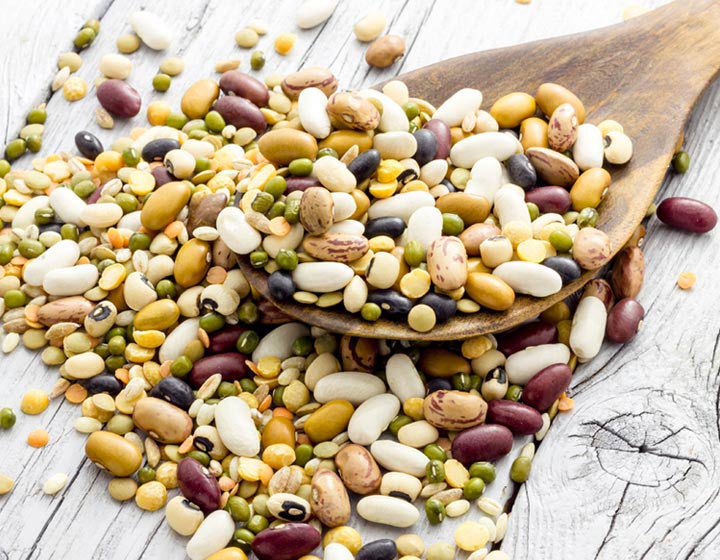
Plant-based eating and living for a more sustainable future
In recent years, an increasing number of people have shifted towards a plant-based diet.1 A mostly plant-based diet involves eating foods made from whole grains, legumes, fruits, vegetables, nuts and seeds that have undergone minimal processing. It does not mean that someone2 must be a vegan or vegetarian, but they should primarily eat plant-based food.
High obesity rates, which now affect over 42% of the population3 and the increased environmental impact of animal-based products are two factors driving people towards the decision to adopt a plant-based lifestyle. Before making this decision, however, you must educate yourself about the negative impacts of certain foods, the positive health effects of others and practical strategies for environmentally responsible eating.
The environmental benefits of plant-based diets
Animal-based products are believed to cause a high amount of global emissions, land degradation and water pollution.4 By shifting to a plant-based diet, you can enjoy many benefits that aid in lowering your carbon footprint and conserving resources.
Reducing greenhouse gas emissions and carbon footprint
The University of Colorado Boulder conducted a study concluding that the animal agriculture sector is responsible for 65% of worldwide nitrous oxide emissions.5 Livestock consumption also equates to 15% of the overall greenhouse emissions and uses 70% of agricultural land. These actions can lead to deforestation and loss of biodiversity.

Ingredion insight: How pulses help
Pulses sequester nitrogen from the atmosphere and affix it to the roots of the plant. Nitrous oxide is 300x more potent than carbon emissions as a green house gas, so pulses bind that into the soil and reduce the need for applied fertilizer.
A more sustainable approach to how we source and create our food is an essential step in lowering some of these impacts. A collaborative effort to reduce emissions, conserve resources and move toward viable food production methods is critical to a prosperous future.
The UN Sustainable Development Goals indicate that alternate proteins must be part of a societal healthy diet by 2030 if we are going to mitigate climate change risks.
Preserving land, water and biodiversity
Animal agriculture requires large amounts of land and water resources to sustain livestock and grow feed crops, which leads to environmental strain. It also poses water risks6 that include flooding, drought and scarcity harmful to ecosystems.
To alleviate this burden, consuming fewer animal products would help cut water usage since raising animals uses over 50% of freshwater.7 Transitioning to a plant-based diet can lower the pressure on water resources and promote sustainable water management.
Mitigating deforestation and habitat destruction
Preserving biodiversity is also a critical aspect of adopting plant-based diets. The majority of global deforestation — around 80% — is for agricultural land use.8 This is especially true in areas where forests are cleared to create grazing land for cattle or to grow feed crops. Such deforestation disrupts ecosystems, displaces wildlife and threatens biodiversity. Reducing the demand for animal products promotes the preservation of natural habitats and can improve ecological balance.
Health benefits of a plant-based diet
A diet filled with plant-derived foods with nutritional benefits can do more than just improve the environment — it also provides a variety of positive benefits for our health.
Nutritional advantages of green eating
Switching to a vegan or vegetarian diet can provide numerous health benefits due to the abundant natural nutrients in fruits and vegetables. Specifically, fruits and vegetables provide the following nutritional benefits.

Lowering inflammation
A diet filled with fruits and vegetables can help reduce inflammation,9 a chronic condition that is linked to various health conditions,10 such as heart disease, diabetes and cancer

Immune system support
Fruits and vegetables can provide plenty of nutrients to support immune function11 by providing vitamins, fiber and antioxidants

Reduced risk of cancer
The antioxidants in fruits and vegetables can fight against harmful free radicals12 that may harm cells and increase cancer risk
A plant-based diet also promotes other vital nutrients as well, such as legumes, which have their own health benefits as well.
Lowering the risk of chronic diseases
A 2023 study by the Journal of the American Medical Association indicates that following a diet mainly of plant-based foods can lower the chances of chronic diseases.13 For example, a plant-based diet with fewer processed foods and no red meat may reduce the risk of heart disease and type 2 diabetes.14 However, it is always important to consult health and wellness experts and educate yourself on the advantages of a healthier diet to manage chronic illnesses effectively.
Promoting overall well-being and vitality
As mentioned, a diet filled with plant-based foods is often rich in vitamins and minerals that can boost your energy levels.
Additionally, eliminating unhealthy foods from a more traditional diet15 may improve your digestion and aid in weight management. That being said, it may also be necessary to add supplements into your routine so your body is getting all the nutrients it needs.
Exploring the variety of plant-based ingredients
Becoming familiar with the wide range of available ingredients is crucial as you transition to a diet focused more on plants and fruit. This will ensure access to essential nutrients as your body adapts to the new meal plan.
Plant-based proteins and their sources
One common concern when transitioning to a plant-based diet is ensuring adequate protein intake. Fortunately, plenty of protein sources derived from plants can provide the necessary nutrients our bodies need. Here are some tips that can help:
- Include legumes like lentils, chickpeas and black beans in your soups, stews and salads
- Add protein-rich nuts and seeds (almonds, walnuts, chia seeds, hemp seeds) into your diet for a healthy snack
- Use plant-based protein sources like tofu, tempeh and seitan instead of meat
These are just some plant-based proteins more commonly found in grocery and health food stores. Exploring various options is critical to eating a balanced, healthier diet.
Abundant plant-based fiber options
Fiber is essential to a healthy diet, aiding digestion and regulating sugar.16 Green diets naturally offer an array of fiber-rich options. Here are a few ways to incorporate fiber into your plant-based meals:
- Berries, apples and oranges are tasty and contain high fiber
- Broccoli, spinach and Brussels sprouts can benefit your health because they are rich in soluble and insoluble fibers
- Whole grains like quinoa, brown rice and oats have plenty of fiber, aiding in digestion
Including these items in your daily meals can ensure a balanced diet with nutrients your body needs and craves.
Plant-based fats and oils for cooking and flavoring
Contrary to previous diet fads, not all types of fats harm our health. Many tasty and nourishing plant oils and fats can be used to cook and flavor our food. Below are a few sources of healthy plant-based fats and oils:
Avocados are rich in heart-healthy fats and can be used in salads, spread on toast or to make guacamole
- Olives and olive oil are filled with monounsaturated fats and can be used on salads or mixed into marinades and dressings
- Medium triglycerides (MCTs)17 are found in coconut and coconut oil, which can add flavor to curries, baked goods and smoothies
- Nuts and seeds such as almonds, flax seeds and sesame seeds contain healthy fats and add texture and flavor to your dishes
- Sugar substitutes like Stevia provide a healthier option and sustainable flavoring to your meals
These healthy fats and oils can also be used to cook, sauté, or flavor food — making healthy eating even more enjoyable.
Practical tips for embracing a plant-based lifestyle
Adopting a green diet may feel challenging initially. However, the transition can be made less stressful with the following tips:
Gradual transition and personalized approach
A gradual transition allows for a smoother adjustment and increases the likelihood of long-term success. Start by including more plant-based meals into your routine and gradually lower the frequency of animal-based products - even choosing to go plant-based one or two days a week can have a tremendous positive impact in reducing our environmental footprint.
The same principle applies to organizations seeking to include more wellness ingredients in their products. Introducing small changes helps to create sustainable solutions. Additionally, providing cleaner labels that consumers trust is essential for a successful transition.
By doing so, you can explore new ingredients, recipes and flavors while finding what works best for your preferences and needs. Remember, small steps can add up to significant results in the long run.
Planning balanced plant-based meals and snacks
Any transition to a different diet plan will inevitably create an initial imbalance in your nutritional intake. To ensure minimal impact, plan out your meals and snacks beforehand so you’re meeting your nutritional requirements. Each meal and snack should have a variety of vitamins, minerals and healthy fats. Preparing your food in advance can also make sticking to your goals easier, especially during busy days. Lastly, meal prepping can be an excellent way to save time and money and diminish food waste.
Incorporating seasonal and local produce
You can make a plant-based diet even more sustainable by planning your meals and snacks around what foods are in season or are in abundance in your region. Choosing seasonal and local produce will allow you to support local farmers and enjoy the freshest and most flavorful ingredients. This approach improves the taste and nutrition of your meals and lessens the environmental impact of transporting food long distances.
Exploring plant-based cooking techniques and recipes
Users who transition to a plant-based diet often explore a wider variety of cuisines and learn new ways to cook and experiment with different recipes. For example, enjoy the versatility of faba bean protein as a substitute for eggs or meat, or use cashews to create creamy, dairy-free sauces. You can also explore cookbooks, online recipe blogs and social media platforms for a wealth of inspiration. Trying new recipes will keep your meals exciting and help you build a repertoire of delicious and satisfying dishes.
Sustainable eating beyond the plate

Sustainable eating extends beyond the choices we make on our plates. It encompasses actions that reduce waste, support eco-friendly practices and promote local agriculture.
Minimizing food waste and composting
Reducing food waste plays an important role in reducing greenhouse gas emissions18 and preserving natural resources. Planning meals, buying only what you need and properly storing perishable items are essential to minimizing food waste. Leftovers can be creatively repurposed into new meals or frozen for later use.
Moreover, establishing a composting system19 enables you to transform food waste and green materials into fertile soil that can be used for your garden. Composting not only lessens waste but also supports healthy soil and plant growth.
Choosing eco-friendly packaging and reducing single-use plastics
Packaging waste — particularly single-use plastics — poses a significant environmental challenge.20 By selecting products that use eco-friendly packaging like recycled materials or biodegradable alternatives, we, as mindful consumers, can have a positive impact. Opting for products with minimal packaging or easily recyclable wrappers is another way to lessen waste.
We can also decrease our reliance on single-use plastics by carrying reusable shopping bags, water bottles and food containers. These small changes can reduce plastic pollution and promote a more promising future.
Supporting local farmers and sustainable agriculture practices
Consider supporting sustainable agriculture by shopping at farmers markets and buying local organic produce, participating in community-supported agriculture (CSA) programs, or joining farm-to-table initiatives that connect you directly with local producers.
Smaller-volume, local farmers often use fewer pesticides and herbicides, reducing their impact on ecosystems and protecting water sources. They may also employ regenerative farming practices 21 that encourage soil health and biodiversity. By supporting local farmers and choosing sustainable, organic produce, you can help promote a healthier environment and future.
Growing your own herbs and vegetables
Whether you have a large backyard or just a few pots on a balcony, cultivating your food allows you to experience the joy of nurturing plants while reducing your carbon footprint. Growing herbs like basil and rosemary or vegetables like tomatoes and peppers provide fresh, flavorful produce and lower the need for transportation and packaging associated with store-bought products. It's a hands-on way to connect with nature, aid biodiversity and taste your culinary creations' freshest, most nutritious ingredients.
Navigating challenges and overcoming obstacles
Embracing a greener lifestyle can be an exciting journey, but it also poses some challenges. However, if you’re set on this new, sustainable way of living and eating, you can overcome these obstacles by utilizing the following tips:
Addressing common concerns about protein and nutrient intake
When switching to a green diet, many worry about getting enough protein and vital nutrients. Rest assured, you can still meet your nutritional needs on a plant-based diet. You can fulfill your protein needs by substituting animal-based protein with options such as legumes, tempeh and quinoa in your meals. It is also essential to address your nutrient intake concerns by consulting a registered dietitian or nutritionist, who can give personalized recommendations and alleviate worries.
Handling social situations and dining out as a plant-based eater
Navigating social events and dining out can sometimes be difficult, but you can easily handle these situations with a few strategies. When attending social gatherings or dining out, it can be helpful to communicate your dietary preferences in advance. Many restaurants offer vegetarian and vegan options or are willing to accommodate special requests.
If you're invited to someone's home, consider offering to bring a dish to share, ensuring there will be something suitable for you to enjoy. Remember, maintaining a positive and open-minded attitude can help create a supportive environment for dietary choices.
Finding community and resources for support
Embarking on a plant-based journey is easier when you have a supportive community and access to valuable resources.Join social media groups or attend events such as meet-ups or cooking classes focusing on green diets to connect with others. These communities provide a space to share experiences, exchange recipes and receive support from others on a similar path.
These are just some ways to embrace sustainable eating and reduce our environmental footprint. We can all contribute to a healthier planet by making mindful decisions about the food we choose and seeking expert guidance.
Additional sustainability resources
Many organizations and resources are dedicated to sustainability and helping individuals reduce their environmental impact. Here are a few to explore:
Websites, blogs and books on plant-based eating and sustainable living

"Forks Over Knives" (Website and Documentary)
Forks Over Knives offers a website and a groundbreaking documentary that promotes a green diet for better health and environmental sustainability. The website provides recipes, meal plans, nutrition and sustainable living articles.

"Eat for the Planet" (Books and Podcast)
Eat for the Planet is a platform that educates and inspires individuals to make conscious food choices. Their website features books, resources and a podcast that explores the intersection of food and sustainability.
Sustainability-focused organizations and initiatives
- People for the Ethical Treatment of Animals (PETA): The website provides many resources to help people transition to a lifestyle that does not involve animal cruelty and to support initiatives that are friendly to animals.
- The Sustainable Food Trust: Is an organization that promotes sustainable food production and consumption. They work to address the environmental, social and health challenges associated with our current food system and offer research, publications and campaigns to drive change.
- The Sustainable Rice Platform (SRP): The Sustainable Rice Platform (SRP) is a global multi-stakeholder alliance of over 90 institutional members, co‐convened by the International Rice Research Institute (IRRI), the United Nations Environment Programme (UNEP) and GIZ. Now established as an independent not-for-profit member association, SRP works with partners from across the stakeholder spectrum to transform the global rice sector by improving smallholder livelihoods, reducing the social, environmental and climate footprint of rice production and by offering the global rice market an assured supply of sustainably produced rice.
- The Sustainable Agriculture Initiative Platform ("SAI Platform") is an impactful organization in the food and beverage industry promoting sustainable agriculture. They are also working on an industry regenerative agriculture standard. Ingredion is a member of SAI Platform, a founding member of their regenerative agriculture program, and proud to have representation on the Executive Committee to help lead their efforts.
- HowGood: HowGood is a SaaS data platform with the world's largest database on food and personal care product sustainability. With more than 33,000 ingredients, chemicals and materials assessed, HowGood helps leading brands, retailers and restaurants improve their environmental and social impact. Through in-depth, ingredient-level insights into factors like greenhouse gas emissions, biodiversity, labor risk, animal welfare and other key impacts, HowGood's data powers strategic decision-making for the sourcing, manufacturing, merchandising and marketing of sustainable products.
- Sustainability and ESG Strategy Solutions: With our deep formulation expertise, broad portfolio of in-demand, plant-based ingredients and comprehensive market and consumer insights, Ingredion helps food and beverage manufacturers advance their environmental, social and governance (ESG) and sustainability programs AND deliver the products that drive brand growth.
Local farmers markets and sustainable food sources
These resources can help you further explore sustainable eating through local farmers markets and take action to reduce your ecological footprint.

The Farmers Market Directory
You can use the Farmers Market Directory website to easily find food options locally sourced in your area. It offers a comprehensive list of farmers markets and farm stands across the United States.

HappyCow
HappyCow provides a comprehensive directory of vegan and vegetarian restaurants, cafes and stores worldwide. It allows users to search for greener options in their area and offers reviews from the community.
Ultimately, you can make many small changes to promote a healthier planet. Taking the initiative and committing to long-term habits will help ensure that our world is here for future generations.
Sources:
1“A Look at plant-based diets,” Missouri Medicine, 2021
2“What is a plant-based diet and why should you try it,” Harvard Health Publishing, 2021
3“Prevalence of Obesity and Severe Obesity Among Adults: United States,” 2017–2018, NCHS, 2020
4“Environmental effects of the livestock industry: The relationship between knowledge, attitudes, and behavior among students in Israel,” Int J Environ Res Public Health, 2019
5“Cowspiracy: The Sustainability Secret,” Kip Andersen, 2014
6“Water usage and animal agriculture,” The Humane League, 2022
7“The case for plant-based,” UCLA, n.d.
8“Agribusiness & deforestation,” Greenpeace, n.d.
9 “Anti-inflammatory effects of plant-based foods and of their constituents,” Int J Vitam Nutr Res. 2008
10“Understanding acute and chronic inflammation,” Harvard Health Publishing, 2020
11“Functional constituents of plant-based foods boost immunity against acute and chronic disorders,” Open Life Sci, 2022
12“Free radicals, antioxidants and functional foods: Impact on human health,” Pharmacogn Rev, 2010
13“Association of healthful plant-based diet adherence with risk of mortality and major chronic diseases among adults in the UK,” JAMA Network Open, 2023
14“Eating processed meats, but not unprocessed red meats, may raise risk of heart disease and diabetes,” Harvard School of Public Health, 2010
15“Clean eating: What happens when you give up highly processed foods,” Health.com, 2022
16“Fiber,” Harvard School of Public Health, 2022
17“Coconut oil,” Harvard School of Public Health, n.d.
18“How does food waste affect the environment,” Earth.org, 2022
19“What is composting,” United States Environmental Protection Agency, 2023
20“The climate impact of single use plastics,” University of Colorado Boulder, 2021
21“What is regenerative agriculture,” NRDC, 2021
